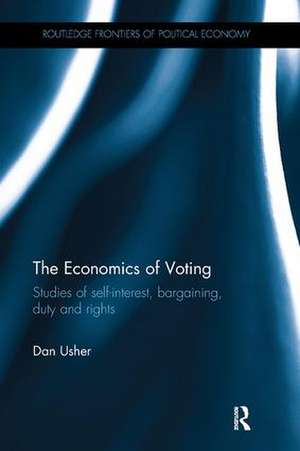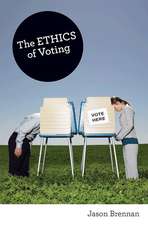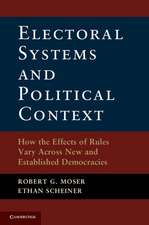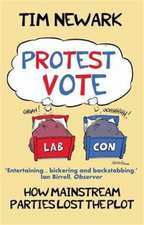The Economics of Voting: Studies of self-interest, bargaining, duty and rights: Routledge Frontiers of Political Economy
Autor Dan Usheren Limba Engleză Paperback – 24 ian 2018
This book examines voting in four key terms: self-interest, bargaining, duty and rights. Self-interest creates a voting equilibrium on various issues, notably the redistribution of income. Bargaining has a larger role to play in voting than in commerce, as it becomes essential in the formation of platforms of political parties and for the passage of laws. A duty to vote arises from the fact that a person’s vote has only an infinitesimal chance of influencing the outcome of an election. Rights are a democracy’s first line of defense against exploitation that, unless constrained, the majority rule voting enables voters to expropriate the corresponding minority, undermining democracy completely.
Four key questions are asked in this book. When is there self-interest in majority rule voting comparable to the general interest in markets? To what extent does ‘government by majority rule voting’ depend upon bargaining as well as voting? Can willingness to vote be attributed to self-interest or is a sense of duty required? Does democracy require property rights? Through an examination of these terms, this book argues that they are indispensable requirements for the maintenance of government by majority rule voting. This book is essential for those who study political economy, economic theory and philosophy as well as political theory.
| Toate formatele și edițiile | Preț | Express |
|---|---|---|
| Paperback (1) | 436.14 lei 6-8 săpt. | |
| Taylor & Francis – 24 ian 2018 | 436.14 lei 6-8 săpt. | |
| Hardback (1) | 1169.16 lei 6-8 săpt. | |
| Taylor & Francis – 17 dec 2015 | 1169.16 lei 6-8 săpt. |
Din seria Routledge Frontiers of Political Economy
-
 Preț: 309.90 lei
Preț: 309.90 lei -
 Preț: 309.79 lei
Preț: 309.79 lei -
 Preț: 316.03 lei
Preț: 316.03 lei -
 Preț: 310.95 lei
Preț: 310.95 lei - 9%
 Preț: 866.82 lei
Preț: 866.82 lei -
 Preț: 309.12 lei
Preț: 309.12 lei -
 Preț: 311.61 lei
Preț: 311.61 lei -
 Preț: 286.99 lei
Preț: 286.99 lei -
 Preț: 327.83 lei
Preț: 327.83 lei -
 Preț: 311.87 lei
Preț: 311.87 lei -
 Preț: 302.76 lei
Preț: 302.76 lei - 9%
 Preț: 938.48 lei
Preț: 938.48 lei -
 Preț: 152.67 lei
Preț: 152.67 lei -
 Preț: 151.97 lei
Preț: 151.97 lei -
 Preț: 318.54 lei
Preț: 318.54 lei -
 Preț: 317.95 lei
Preț: 317.95 lei -
 Preț: 310.01 lei
Preț: 310.01 lei -
 Preț: 326.49 lei
Preț: 326.49 lei -
 Preț: 155.44 lei
Preț: 155.44 lei -
 Preț: 309.79 lei
Preț: 309.79 lei -
 Preț: 328.76 lei
Preț: 328.76 lei -
 Preț: 281.72 lei
Preț: 281.72 lei -
 Preț: 286.58 lei
Preț: 286.58 lei -
 Preț: 386.12 lei
Preț: 386.12 lei -
 Preț: 353.78 lei
Preț: 353.78 lei -
 Preț: 325.09 lei
Preț: 325.09 lei -
 Preț: 310.55 lei
Preț: 310.55 lei -
 Preț: 371.95 lei
Preț: 371.95 lei -
 Preț: 324.87 lei
Preț: 324.87 lei -
 Preț: 312.86 lei
Preț: 312.86 lei -
 Preț: 374.16 lei
Preț: 374.16 lei -
 Preț: 329.09 lei
Preț: 329.09 lei -
 Preț: 348.22 lei
Preț: 348.22 lei - 28%
 Preț: 1047.06 lei
Preț: 1047.06 lei - 18%
 Preț: 1169.45 lei
Preț: 1169.45 lei - 18%
 Preț: 1555.17 lei
Preț: 1555.17 lei - 18%
 Preț: 1048.43 lei
Preț: 1048.43 lei - 18%
 Preț: 1059.84 lei
Preț: 1059.84 lei - 31%
 Preț: 767.47 lei
Preț: 767.47 lei - 18%
 Preț: 731.92 lei
Preț: 731.92 lei - 26%
 Preț: 822.54 lei
Preț: 822.54 lei - 18%
 Preț: 1796.21 lei
Preț: 1796.21 lei - 26%
 Preț: 1184.91 lei
Preț: 1184.91 lei - 18%
 Preț: 1120.23 lei
Preț: 1120.23 lei - 15%
 Preț: 700.95 lei
Preț: 700.95 lei - 18%
 Preț: 1116.31 lei
Preț: 1116.31 lei - 22%
 Preț: 299.52 lei
Preț: 299.52 lei
Preț: 436.14 lei
Nou
Puncte Express: 654
Preț estimativ în valută:
83.46€ • 89.24$ • 69.58£
83.46€ • 89.24$ • 69.58£
Carte tipărită la comandă
Livrare economică 18 aprilie-02 mai
Preluare comenzi: 021 569.72.76
Specificații
ISBN-13: 9781138495432
ISBN-10: 1138495433
Pagini: 334
Ilustrații: 51 Line drawings, black and white; 21 Tables, black and white; 51 Illustrations, black and white
Dimensiuni: 156 x 234 x 19 mm
Greutate: 0.45 kg
Ediția:1
Editura: Taylor & Francis
Colecția Routledge
Seria Routledge Frontiers of Political Economy
Locul publicării:Oxford, United Kingdom
ISBN-10: 1138495433
Pagini: 334
Ilustrații: 51 Line drawings, black and white; 21 Tables, black and white; 51 Illustrations, black and white
Dimensiuni: 156 x 234 x 19 mm
Greutate: 0.45 kg
Ediția:1
Editura: Taylor & Francis
Colecția Routledge
Seria Routledge Frontiers of Political Economy
Locul publicării:Oxford, United Kingdom
Public țintă
Postgraduate and UndergraduateCuprins
I. Introduction II. Voting Patterns III. Voting about the Redistribution of Income IV. How High Might the Revenue-maximizing Tax Rate Be? V. Bargaining and Voting VI. Bargaining Unexplained VII. What Exactly is a Duty to Vote? VIII. An Alternative Explanation of the Chance of Casting a Pivotal Vote IX. The Problem of Equity X. Voting Rights, Property Rights and Civil Rights XI. Assessing the Citizen-candidate Model XII. The Significance of the Probabilistic Voting Theorem
Descriere
The economics of voting is about when, and subject to what qualifications, electoral markets are like ideal commercial markets where universally self-interested behaviour yields outcomes that are in some sense best for society as a whole. Self-interest can be relied upon in voting about the redistribution of income, narrowing the gap between rich and poor, without removing the gap completely, altering people’s ordering on the scale of rich and poor or destroying incentives to work and save. Elsewhere, self-interested voting can lead to inconsistent collective behaviour, and must be supported by bargaining, duty and rights.
Bargaining is indispensable in the formation of platforms of political parties, passage of laws in the legislature and other situations where two or more magnitudes must be voted upon simultaneously. Bargaining is ubiquitous but mysterious, with no plausible equilibrium comparable to the equilibrium in competitive markets. A duty to vote arises because the chance of any person’s vote influencing the outcome of an election is too small to justify the time and trouble of voting. Wide-spread abstention is corrosive, but the purely self-interested person abstains. A duty to vote need not require a person to vote for the party seen as best for society as a whole. It may be sufficient to vote for the party seen as best for oneself alone.
Rights are the citizen’s defence against exploitation. Unconstrained, majority rule voting allows any majority of the electorate that can vote as a block - a majority identified by race, religion or social class - to expropriate the corresponding minority completely. No government in office and its supporters would risk losing office in an election if loss of office meant destitution at the hands of its successors. Constraints include property rights that may be modified by systematic redistribution but not discarded or altered indiscriminately if democratic government is to be preserved.
This book would be of interest to political scientists, economists and philosophers, and would serve as a text for senior undergraduate or graduate courses.
Bargaining is indispensable in the formation of platforms of political parties, passage of laws in the legislature and other situations where two or more magnitudes must be voted upon simultaneously. Bargaining is ubiquitous but mysterious, with no plausible equilibrium comparable to the equilibrium in competitive markets. A duty to vote arises because the chance of any person’s vote influencing the outcome of an election is too small to justify the time and trouble of voting. Wide-spread abstention is corrosive, but the purely self-interested person abstains. A duty to vote need not require a person to vote for the party seen as best for society as a whole. It may be sufficient to vote for the party seen as best for oneself alone.
Rights are the citizen’s defence against exploitation. Unconstrained, majority rule voting allows any majority of the electorate that can vote as a block - a majority identified by race, religion or social class - to expropriate the corresponding minority completely. No government in office and its supporters would risk losing office in an election if loss of office meant destitution at the hands of its successors. Constraints include property rights that may be modified by systematic redistribution but not discarded or altered indiscriminately if democratic government is to be preserved.
This book would be of interest to political scientists, economists and philosophers, and would serve as a text for senior undergraduate or graduate courses.













